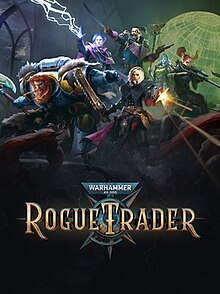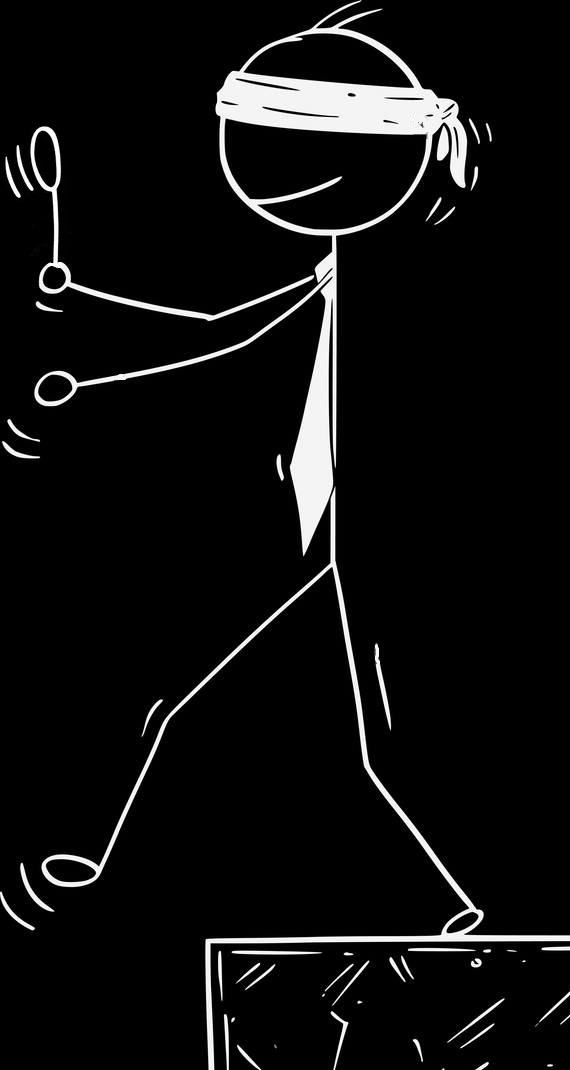Blind Guides
By Anthony Casperson
1-18-25
Over the past few weeks I’ve been playing a video game set in the Warhammer 40,000 universe called Rogue Trader. It’s my first foray into the universe. And not long into playing the game, I said that of all the storied universes I’ve experienced from movies, TV shows, books, and video games, this universe is probably the one I’d be least likely to want to live in.
And that’s looking at just the incessant bureaucracy.
My opinion hasn’t changed since playing further into the game, but my reasoning has broadened. One of those further examples of frustration comes from how much human decency is thrown out the airlock for the sake of rooting out heresy. The dogma for the Imperium of Humanity is used as an excuse to mete out personal “justice” that cares little for the vast swaths of human life that it crushes under the dust.
And what’s worse, is that adherents of competing views toward what that actual dogma is all about join forces in order to wipe out people whose views are far less extreme than what the heresy hunters believe.
One example—and I’m sorry for the graphic nature of the scene, but the extreme speaks very well to my point—came later in the game. My main character walked onto a space station that they’d been on quite a few times by that point. And while the station had some problems, like being run by a cadre of piratical individuals, at least there was some modicum of neutral ground that kept enough peace among the most populated areas.
But one character who held control over about a third of the planetary systems in this remote part of the universe—a fellow Rogue Trader—had set her eyes on rooting out the heresy of this important space station. A personal crusade that went about hanging and burning anyone who had even had a single dealing with pirates. (And remember, the whole place had been run by such people. So, that point of contact would be true of nearly every person on board the station.)
Walking past the heaps of dead bodies, my character noticed this woman sitting on a throne in the middle of an open area with pages of “crimes” that these victims had committed in one hand, and a silver spoon in the other. And what was she using that spoon for? Eating a man’s brain. Out of his skull. While he was still alive.
After taking a moment to ensure that I myself wasn’t going to heave at the blatant disregard for human life, my character asked, “What do you think you’re doing?!” To which the person on the throne looked down at the exposed brain and said, “What? Cannibalism isn’t heretical.”
It was at this point that I thought about how often we try to excuse our own hypocrisies by finding exceptions or loopholes in our worldviews and beliefs. How often we seek the harshest of punishments for people who could use just a little correcting, while we find no wrong in our blatant disregard for those around us.
Sure, we don’t literally sit on thrones, passing out death sentences with a silver spoon in one hand, but human beings do have a nasty habit of desiring judgement on others while excusing our own actions.
Don’t believe me? Think about this example. You’re driving down the highway and some crazy speedster nearly rear ends you because they couldn’t get around you right that second. Finally, they whip around you, rev their engine, and roar past you. The first inclination is to call them an idiot, followed shortly thereafter by a desire that a police car is up ahead checking for people like them.
But, let’s flip the script a little. You’re running a tiny bit late and need to get moving. But red lights keep stopping you. There’s construction on half the roads. And an accident left only a single lane open on the highway for quite a distance. Everything has put you further behind.
Then finally, an empty road opens up in front of you, so you floor it. But not long after this glorious moment, up ahead you see a pair of cars driving pretty evenly next to each other. Some “slow-mo” is in the fast lane going only 10 over the speed limit. You get right up behind the car to encourage them to drive a little faster, calling them an idiot the whole time, wondering how they ever got their license. And once the slightest opening happens, you whip around them—hopefully, not whipping something else.
Why is it always the other drivers’ fault?
It’s because we excuse our own actions, while calling out inconsistencies of others. We point out every heresy while finding an exception to excuse our own disregard for human life. Surrounded by a pile of “heretics” while licking clean our silver spoon.
We act in a similar fashion to the Pharisees of Jesus’ time. Following their examples in actions that Jesus called them out for. In Matthew 23:13-39, we see Jesus speak seven woes to the Pharisees. Those hypocrites. But it’s the third and fourth woes that encapsulate the issue we’re dealing with here. The woes that Jesus brackets with the term “blind guides.”
With the third of these woes, found in verses 16-22, Jesus speaks to the Pharisees’ attempts to find loopholes in keeping their word. They’d swear by the temple that they’d do something, but then refuse to do it. And when they were confronted about it, they’d say, “Well, did I swear by the temple? Or the gold of the temple?”
Basically, they were making an argument that taking an oath on a more specific aspect was more binding. Thus, they believed that they could get out of an oath made over a less specific aspect. They’d say the same thing about an oath made on the altar, instead of the sacrifice on the altar, and an oath made with regard to heaven, instead of the throne of God in heaven.
Jesus counters this loophole by asking what is actually greater? The gold, or the residence of God that makes the gold holy? The sacrifice, or the altar that makes it more than just another dead animal carcass?
The questions might sound strange to us, but Jesus was making the point that their desire to find a loophole in order to get them out of keeping their word made them forget the whole point of an oath to begin with. It was a statement of surety that mirrored God’s sure word with his people. The oaths were supposed to represent the godliness of the interaction, while also lifting up the other person with whom this oathed covenant was made.
It says something about the covenant that they believed in. And something terrible about the God they supposedly served.
These blind guides were disregarding the whole point of the ways of God, in order to benefit only themselves. They were saying, “What? This exception isn’t heretical,” while missing the point of how wrong what they were doing was.
And what’s worse is that they were teaching others that this is how life should be lived. When we call our exceptions and loopholes good, all we’re doing is teaching others that this is what God is like and how his people are to live.
Blind guides who think that we know where we’re going, when all that we’re actually doing is leading to terrible and dangerous places.
The fourth woe, found in Matthew 23:23-24, makes the point more succinctly. Jesus calls out the Pharisees for caring about not giving one ounce more than necessary for the tithe of grains. They’d count out each individual grain so that they knew the exact number that they were obliged to give. But in doing so, had missed the point of the offering.
They’d missed the weightier matters of law and justice and mercy and faithfulness.
We’re not supposed to count the offerings and sacrifices as if they’re costs that we begrudgingly have to give. Not when we’re offering to the God who blessed us with what we have to begin with. And the offering in Jesus’ day went to provide for the priests and their families, as they worked the purposes of God. This penny-pinching “sacrifice” cared more for the life of one’s self than the good of those whom God had called to teach and lead in godliness.
In trying to find loopholes to aid only our own comfort, we miss the whole point of godliness. We pick out the fly in our soup, but miss the camel swimming in it. While seeking justice amongst heretics, we miss how blatant our disregard for human life is. And how disgusting the thing on our silver spoon is.
And while most of us would agree that people who add more and more rules end up being rather hypocritical, blindness doesn’t exist only in these guides. The concept of finding exceptions and loopholes to appease our own hypocrisies can also exist when we attempt to loosen the rules. When we say that this concept of sin is old or outdated, because we now “know better.”
It’s not the presence of rules, or lack thereof, that is the point. There’s a weightier matter for us to see. A more important aspect to this whole thing.
If we’re not representing the goodness and holiness and righteousness of God in the things that we’re doing, then there is no excuse for our actions. No loophole to make our deeds holy. No right to say, “What? This isn’t heretical.”
Only when we act in alignment with the whole image of God—the one that human beings are meant to represent—are we living holy lives. And anything else leaves us as nothing more than blind guides, sitting on our thrones with a silver spoon in one hand.



